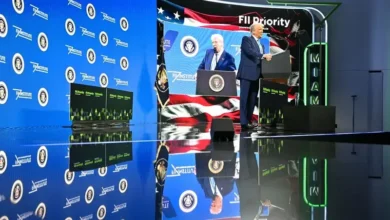US Senate border security bill: What you need to know

Democratic leaders in the US Senate have unveiled a $118bn bill that would boost border security and provide wartime aid for Israel and Ukraine. But the fate of the new proposal, backed by some Republican senators, looks uncertain after House Speaker Mike Johnson denounced it, saying it’s not tough enough on migrants.
What is the border security bill?
After months of negotiations, United States senators have finally produced a 370-page bill, which would give the government emergency powers to refuse entry to migrants crossing the border or to quickly expel those who had already entered the US. Those powers would not restrict the entry of US citizens or others with a legal basis to come to the country.
The new bill has introduced the concept of a trigger, which will be tripped when the number of migrants encountering border officials crosses an average of 5,000 over the course of a week. The bill also gives the president the power to shut the southern border with Mexico if more than 4,000 migrants attempt to cross the border in a week.
The bill would require the government to process at least 1,400 migrants per day at border crossings, and would maintain some protections for people who fear torture or persecution after being deported. And it caps the number of days the emergency powers can be used each year.
Some provisions of the proposed bill aim “to make border security tighter, to make immigration checks much stricter,” reported Al Jazeera’s Alan Fisher, from Washington DC.
What do we know about the aid proposal in the Senate bill?
- The bill would direct about $20bn to additional enforcement on the US border with Mexico and to combat drug trafficking.
- About $60bn in additional aid has been earmarked for Ukraine. A large part of this would come in the form of weapons and military equipment. Around $20bn of this is to replenish US stockpiles of equipment transferred to Ukraine and another $13.8bn is to allow Kyiv to buy more munitions from US suppliers.
- The Senate plan directs $14.1bn to Israel. Around $5.2bn of this funding is allocated to missile defence systems.
- It also strips US funding for the United Nations Relief and Works Agency for Palestine Refugees (UNRWA) after Israel accused 12 of its Palestinian employees of being involved in Hamas’s October 7 attack. The UNRWA chief has told the Financial Times newspaper that Israel has yet to present evidence in support of its accusations.
- The bill allocates $2.4bn for operations around the Red Sea, where US forces have sought to combat attacks on shipping by Houthi rebels in Yemen.
- The bill would spend almost $2.6bn on efforts to deter China. Most of the money, about $1.9bn, would be to replace US munitions provided to Taiwan.
Senate Majority Leader Chuck Schumer, from the Democratic Party, has said an initial vote on the bill would take place no later than Wednesday, but faces opposition from both Republicans and Democrats.
What do Democrats want out of the bill?
Prior to the introduction of this bill, Democrats were pushing for a White House funding request that pairs tens of billions of dollars for Ukraine and Israel. They have also proposed to allocate nearly $14bn for US border security. That money would pay for 1,300 additional US Border Patrol agents, 1,600 new asylum officers and 375 new judge teams.
US President Joe Biden is pushing for the bill to be voted on, saying this makes the border more secure than it has been in decades.
“Now we’ve reached an agreement on a bipartisan national security deal that includes the toughest and fairest set of border reforms in decades. I strongly support it,” Biden said in a statement.
Fisher said Biden is essentially saying “It’s time for Republicans to stop playing politics with the border and get this to him so he can sign the bill as quickly as possible.”
However, this is not easy for Biden to achieve. Republican Steve Scalise – the majority leader of the House of Representatives, who decides essentially when the House votes – has already said that he is not going to bring this to the floor of the House.
“Joe Biden says there’s still a lot of work to be done to get this over the line. This bill is struggling just hours after its birth,” said Al Jazeera’s Fisher.
What do Republicans want out of the bill?
Mitch McConnell, the top Senate Republican, has been supportive of the negotiations over the bill. But his colleagues in the Senate have said that they’re against the bill before even seeing the details, Al Jazeera’s Fisher said.
Republicans say Biden has encouraged migrants by loosening restrictions that date from the era of former President Donald Trump and that require migrants and asylum seekers to wait in Mexico while their claims are processed. They also oppose new Biden “parole” policies that allow certain migrants to enter legally for humanitarian reasons, saying they circumvent standard immigration channels.
Immigration is a top concern for conservative voters ahead of the 2024 presidential elections that will decide control of the White House and Congress. Biden, a Democrat, is seeking a second term, and Trump is the clear frontrunner for the Republican nomination.
Al Jazeera’s Fisher said that some Republicans opposing the bill said they were not going to vote for it because it could give Biden a bipartisan victory in an election.
House Speaker Johnson has called on the Democratic-led Senate to approve a bill passed by the House in May that would effectively end access to asylum at the border. The measure, known as HR 2 or the Secure the Border Act of 2023, passed with broad Republican support without Democratic backing.
The bill mandates construction of at least 900 miles of border wall, a signature Trump policy.










